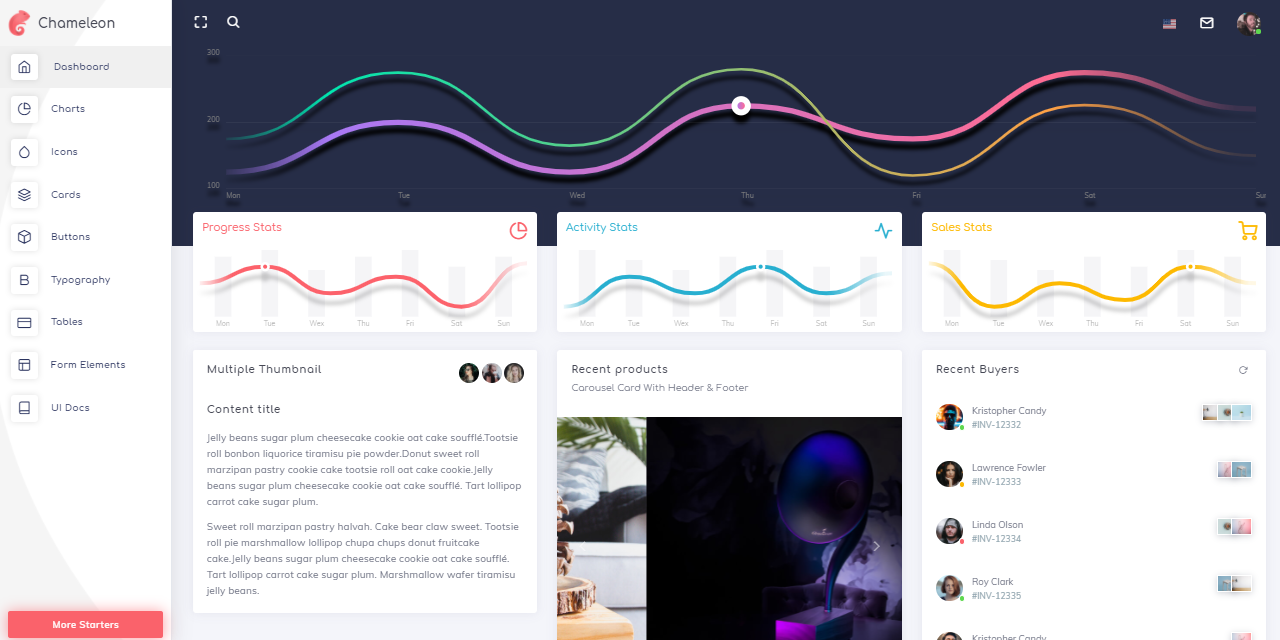Jinja Template - Chameleon Dashboard | AppSeed
Jinja Template project generated by AppSeed on top of a modern UI Kit. The project is a super simple Flask project WITHOUT database, ORM, or any other hard dependency. The project can be used as a codebase for future project or to migrate the Jinja files and assets to a legacy Python-based project that uses Jinja as template engine (Flask, Bottle, Django).
Features:
Links
Vendor Notes - Chameleon Admin Lite is a Free Modern Bootstrap 4 WebApp & Admin Dashboard Html Template elegant design, clean and organised code.
Chameleon admin template is powered with HTML 5, CSS 3, Bootstrap 4, SASS, Gulp. Responsive design which looks great on Desktops, Tablets, and Mobile Devices. Chameleon bootstrap admin template comes with starter kit which will help developers to get started quickly.

$ # Clone the sources$ git clone https://github.com/app-generator/jinja-template-chameleon-dashboard.git$ cd jinja-template-chameleon-dashboard$$ # Virtualenv modules installation (Unix based systems)$ virtualenv env$ source env/bin/activate$$ # Virtualenv modules installation (Windows based systems)$ # virtualenv env$ # .\env\Scripts\activate$$ # Install requirements$ pip3 install -r requirements.txt$$ # Set the FLASK_APP environment variable$ (Unix/Mac) export FLASK_APP=run.py$ (Windows) set FLASK_APP=run.py$ (Powershell) $env:FLASK_APP = ".\run.py"$$ # Set up the DEBUG environment$ # (Unix/Mac) export FLASK_ENV=development$ # (Windows) set FLASK_ENV=development$ # (Powershell) $env:FLASK_ENV = "development"$$ # Run the Jinja Template$ # --host=0.0.0.0 - expose the app on all network interfaces (default 127.0.0.1)$ # --port=5000 - specify the app port (default 5000)$ flask run --host=0.0.0.0 --port=5000$$ # Access the UI in browser: http://127.0.0.1:5000/
The project has a simple structure, represented as bellow:
< PROJECT ROOT >||-- app/__init__.py|-- app/| |-- static/| | |-- <css, JS, images> # CSS files, Javascripts files| || |-- templates/| | || | |-- includes/ # Page chunks, components| | | || | | |-- navigation.html # Top bar| | | |-- sidebar.html # Left sidebar| | | |-- scripts.html # JS scripts common to all pages| | | |-- footer.html # The common footer| | || | |-- layouts/ # App Layouts (the master pages)| | | || | | |-- base.html # Used by common pages like index, UI| | | |-- base-fullscreen.html # Used by auth pages (login, register)| | || | index.html # The default page| | login.html # Auth Login Page| | register.html # Auth Registration Page| | page-404.html # Error 404 page (page not found)| | page-500.html # Error 500 page (server error)| | *.html # All other pages provided by the UI Kit||-- requirements.txt||-- run.py||-- ************************************************************************
The project comes with a basic configuration for Docker, Gunicorn, and Waitress.
The steps to start the template using Docker:
Get the code
$ git clone https://github.com/app-generator/jinja-template-chameleon-dashboard.git$ cd jinja-template-chameleon-dashboard
Start the app in Docker
$ sudo docker-compose pull && sudo docker-compose build && sudo docker-compose up -d
Visit http://localhost:5005 in your browser. The app should be up & running.
Gunicorn ‘Green Unicorn’ is a Python WSGI HTTP Server for UNIX.
Install using pip
$ pip install gunicorn
Start the app using gunicorn binary
$ gunicorn --bind 0.0.0.0:8001 run:appServing on http://localhost:8001
Visit http://localhost:8001 in your browser. The app should be up & running.
Waitress (Gunicorn equivalent for Windows) is meant to be a production-quality pure-Python WSGI server with very acceptable performance. It has no dependencies except ones that live in the Python standard library.
Install using pip
$ pip install waitress
Start the app using waitress-serve
$ waitress-serve --port=8001 run:appServing on http://localhost:8001
Visit http://localhost:8001 in your browser. The app should be up & running.
Jinja Template Chameleon Dashboard - Provided by AppSeed Web App Generator.